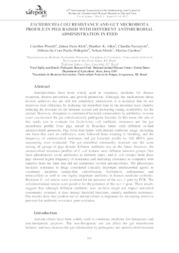Escherichia coli resistance and gut microbiota profile in pigs raised with different antimicrobial administration in feed.
Escherichia coli resistance and gut microbiota profile in pigs raised with different antimicrobial administration in feed.
Autoria: PISSETTI, C.; KICH, J. D.; ALLEN, H. K.; NAVARRETE C.; PELLEGRINI, D. da C. P.; MORES, N.; CARDOSO, M. R. de I.
Resumo: Abstract: Antimicrobials have been widely used in veterinary medicine for disease treatment, disease prevention, and growth promotion. Although, the mechanisms about in-feed additives use are still not completely understood, it is accepted that its use improves feed efficiency by reducing the microbial load in the intestinal tract, thereby reducing the pressure on the immune system and increasing energy availability for the animal. However, disruption to commensal bacterial communities by antibiotics in some cases can increase the gut colonization by pathogenic bacteria. In this sense, the aim of this study was to evaluate the Escherichia coli antibiotic resistance and the gut microbiota profile from pigs raised in Brazilian farms with different in-feed antimicrobials protocols. Pigs from four farms with distinct antibiotic usage, including one farm that used no antibiotics, were followed from weaning to finishing, and the frequency of antimicrobial resistance and gut bacterial profile by 16S rRNA gene sequencing were evaluated. The gut microbial community structure was the same among all groups of pigs despite different antibiotic use on the farms; however, the antimicrobial resistance profiles of E. coli isolates were different between groups. One farm administered seven antibiotics at different times, and E. coli isolates from these pigs showed higher frequency of resistance and multidrug resistance as compared with samples from the farm that did not administer in-feed antimicrobials. The phenotypes included resistance to drugs considered critically important antimicrobial agents in veterinary medicine (ampicillin, ciprofloxacin, florfenicol, sulfonamide and tetracycline) as well as one highly important antibiotic in human medicine (colistin). Resistant E. coli strains were screened for the presence of the mcr-1 gene by PCR. The colistin-resistant strains were positive for the presence of the mcr-1 gene. These results suggest that although different antibiotic uses on-farm might not impact microbial community structure, it does impact bacterial functions, namely antibiotic resistance. Our results show that prudent use of antimicrobials is important for decreasing selective pressure for antibiotic resistance gene evolution
Ano de publicação: 2017
Tipo de publicação: Artigo em anais e proceedings
Unidade: Embrapa Suínos e Aves
Palavras-chave: Bacteriologia, Escherichia coli, Resistência microbiana, Safe pork, Suíno, Uso de antibióticos
Observações
1 - Por padrão são exibidas publicações dos últimos 20 anos. Para encontrar publicações mais antigas, configure o filtro ano de publicação, colocando o ano a partir do qual você deseja encontrar publicações. O filtro está na coluna da esquerda na busca acima.
2 - Para ler algumas publicações da Embrapa (apenas as que estão em formato ePub), é necessário ter, no celular ou computador, um desses softwares gratuitos. Sistemas Android: Google Play Livros; IOS: iBooks; Windows e Linux: software Calibre.
Acesse outras publicações
Acesse a Base de Dados da Pesquisa Agropecuária (BDPA) para consultar o acervo completo das bibliotecas da Embrapa.

